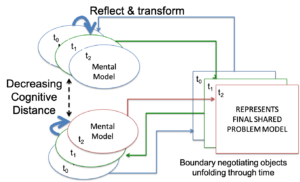Collaborative Research: Employing Model-Based Reasoning in Environmental Science (EMBeRS)
Model-based reasoning ignites the embers of the mind.
To meet workforce demands and address global environmental challenges, research teams must learn to connect divergent knowledge and perspectives from other disciplines and integrate it with their own expertise; then, move forward in collaborative ways.
Using the EMBeRS Graduate Education Model, based on cognitive science theories, this project trained faculty from multiple institutions to implement the approaches in their courses. It also incorporated a two-week learning experience for doctoral students from several universities.
The EMBeRS project partners:
1) environmental, geologic, and geographic scientists with substantive education experience and/or cross training in the learning sciences;
2) formally educated learning scientists who specialize in science education; and
3) faculty teaching interdisciplinary environmental science classes willing to design and test EMBeRS-based activities.
Read the abstract
Learn more with UTEP’s EMBeRS page
Access EMBeRS Training Materials
The model includes
- Placing students in multidisciplinary teams (not a new idea)
- Providing a structured, participatory engagement process (not a new idea but not commonly implemented)
- Providing a progression of standard, individual and group model-based reasoning activities (new)
- Providing instruction for the purposeful co-creation of boundary objects by students (new)

